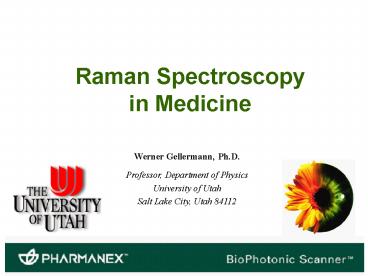Raman Spectroscopy in Medicine - PowerPoint PPT Presentation
1 / 17
Title:
Raman Spectroscopy in Medicine
Description:
Department of Dermatology. Tissa Hata, M.D. Lynn Pershing, Ph.D. Theresa Scholz, M.D. ... High concentrations of xanthophyll carotenoids lutein and zeaxanthin ... – PowerPoint PPT presentation
Number of Views:249
Avg rating:3.0/5.0
Title: Raman Spectroscopy in Medicine
1
Raman Spectroscopyin Medicine
Werner Gellermann, Ph.D.
Professor, Department of Physics University of
Utah Salt Lake City, Utah 84112
2
Center for Biomedical Optics
Laser Institute Igor Ermakov, Ph.D. Robert
McClane Maia Ermakova Steven Wintch Lihong
Jin Mohsen Sharifzadeh
Projects Raman Detection of Carotenoid
Pigments Coherence Domain Optical
Imaging Photodynamic Therapy Solid State Laser
Development
Moran Eye Center Paul Bernstein, Ph.D,
M.D. Nikita Katz, Ph.D Da-You Zhao, M.D. Prakash
Bohsale, M.D.
Funding National Institute of Health National
Eye Institute Research to Prevent Blindness,
Inc. Spectrotek, L.C.
Department of Dermatology Tissa Hata, M.D. Lynn
Pershing, Ph.D. Theresa Scholz, M.D.
3
Age-related Macular Degeneration (AMD)
Healthy retina
Dry AMD
Wet AMD
4
AMD Risk versus Age
5
Carotenoids in Human Retina
- Macula retinal area of highest visual acuity
- High concentrations of xanthophyll carotenoids
lutein and zeaxanthin (yellow coloration) - Role of carotenoids optical filtering
antioxidants (protection of macula from
light-induced damage) - Individuals with high dietary intakes and blood
levels of lutein and zeaxanthin have a lower rate
of visual loss from age-related macular
degeneration (AMD), the leading cause of
blindness in the elderly.
6
Raman ScatteringSir Chandrasekhar Raman, Nobel
Prize in Physics 1930
Vibronic Energy Levels
Carotenoid molecules shift blue laser light color
to green
7
Raman Spectroscopy of Carotenoids
Carotenoids have a characteristic Raman spectral
fingerprint generated from vibrations of their
long carbon backbone. Any other molecule would
produce a different fingerprint (peaks with
different locations and intensities)
8
Portable Clinical Raman Instrument
9
Loss of Macular Pigment with Increasing Age
10
Comparison of Health Screening Tests
11
Carotenoids in other Tissues
Largest Organ of the Human Body ?
! Skin !
12
Sunlight - induced Singlet Oxygen /
Reactive Oxygen Species
13
Lycopene and ? -Carotene
- Most potent singlet oxygen quenchers found in the
human body - Predominant carotenoids found in skin
- Lipophilic molecules making them especially well
suited to act as chain-breaking antioxidants in
the lipid-rich epidermis - Resonant Raman spectroscopy for non-invasive
detection ?
14
Raman Spectra of Human Skin Measured in Vivo
Typical Raman spectra for human ventral forearm
skin, measured in vivo. Illumination conditions
488 nm laser wavelength, 10 mW laser power, 20
sec exposure time, 2 mm spot size. Spectrum
shown at top is spectrum obtained directly after
exposure, and reveals broad, featureless, and
strong fluorescence background of skin with
superimposed sharp Raman peaks characteristic for
carotenoid molecules. Spectrum at bottom is
difference spectrum obtained after fitting
fluorescence background with fifth-order
polynomial and subtracting it from top spectrum.
The main characteristic carotenoid peaks are
clearly resolved with good signal-to-noise ratio,
at 1159 and 1524 cm-1.
15
Non-Invasive Laser Raman Detection of Carotenoids
in Human Skin
- Feasible to assess carotenoid content in large
numbers of subjects - Permits study of correlation between disease and
tissue antioxidant levels - Also Nutrition (bioavailability studies,
uptakes, correlation with blood levels, etc.)
16
Summary
- Measured carotenoid antioxidants in living human
tissues in vivo using novel non-invasive optical
method - Sensitive, specific and precise optical technique
- Future use Improve the health of the world with
simple high-tech screening test
17
Patents































